Somalia: 10 things we've learnt
- Published
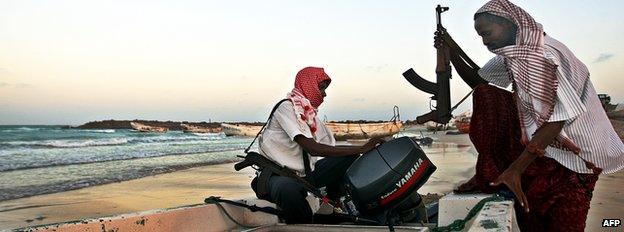
A leaked UN report on Somalia has alleged that much of the money received by the interim government has been frittered away.
The allegations of such high-level corruption have shocked many, with estimates that around 70% of money intended for development and reconstruction in a country racked by 20 years of war was unaccounted for.
The government, whose mandate expires next month, dismissed them as "absolutely and demonstrably false".
But the 198-page report, published on the Somalia Report website, external and due to be discussed by the Security Council, contains many other revelations. Here are 10 other things we have learnt:
1: Floating armouries
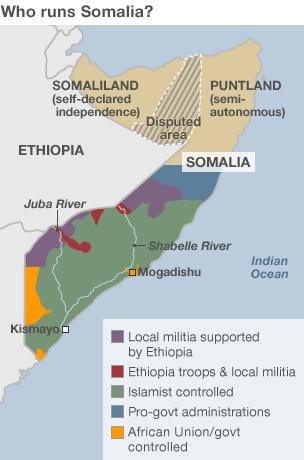
Some ships travelling through the Red Sea and around the east coast of Africa increasingly use private security firms to prevent pirates based in Somalia from seizing their vessels.
But because many countries in the region will not allow them to work from their territories, these firms are increasingly turning to what the UN calls "floating armouries", which the report says is a "new and highly profitable business".
They are typically older ships such as tugs, supply and research vessels - used as platforms for storing and transferring weapons and ammunition at sea, outside any country's territorial waters.
They are uncontrolled and "almost entirely unregulated, posing additional legal and security challenges for all parties involved", the report said.
Some 18 vessels operating in international waters have an estimated 7,000 weapons at their disposal to hire out.
It warns that unless a mechanism for international regulation, monitoring and inspection these facilities is established, there is a genuine risk that they will eventually become a threat to regional peace and security, rather than being part of the solution.
There have already been several incidents when the arms have turned up in unexpected places, like in Mozambique where five police officers were found to have 62 weapons and ammunition belonging to one of the private security companies.
Three British citizens were reportedly arrested in Egypt in April with a range of such arms, including laser-guided sniper rifles.
2: Pirates diversify
Pirates have never been more active than in 2011, but the number of successful attacks has dropped dramatically - by 43% compared to 2010 - thanks to the increasing use of private maritime security companies, the report says.
As a result, pirates have adapted and turned to kidnapping for ransom on land, holding aid workers, journalists and tourists hostage.
The Monitoring Group says pirates also market their services as "counter-piracy experts" and "consultants" in ransom negotiations.
One of the pirate groups known to have become involved in both kidnapping and "consulting" is called the Indian Ocean Network.
Investigators said some pirates may also have ties to militants from the al-Shabab Islamist group, Somali officials and private security companies involved in the counter-piracy business.
3: Pirates with passports
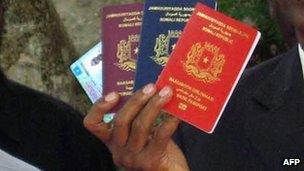
How did a pirate leader get his hands on a red diplomatic passport?
A growing number of the piracy fraternity are also members of the diaspora "whose foreign language skills, passports and bank accounts are all valuable assets", the report said.
It also revealed the collusion of senior government officials in shielding a notorious "pirate kingpin" from prosecution by providing him with a diplomatic passport and describing him as a "counter-piracy envoy".
It is alleged that Mohamed Abdi Hassan - known as "Afweyneh", meaning "Big Mouth" in Somali - is "one of the most notorious and influential leaders of the Hobyo-Harardhere Piracy Network".
Somalia's President Sheikh Sharif Sheikh Ahmed admitted to the UN investigators that he had given Afweyneh diplomatic status as "one of several inducements intend[ed] to obtain the dismantling of his pirate network".
4: Charcoal ban flouted
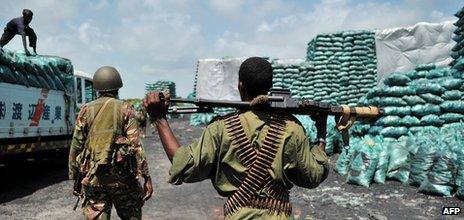
Al-Shabab has lost two ports from where charcoal was exported
Much of al-Shabab's revenue still comes from charcoal despite a UN Security Council ban on its export from Somalia, as the United Arab Emirates and Saudi Arabia are both failing to impose it.
The total trade volume of charcoal exports from southern Somalia in 2011 actually increased to between 9 million and 10 million sacks, generating revenues for the al-Qaeda group in excess of $25m (£16m), the investigators found.
The export of charcoal from Kismayo, Barawe and Merka increased in order to compensate for the loss of charcoal exports from the ports of Bur Gabo and Qudha, which were seized by Kenyan troops in late 2011 and early 2012.
But the group's loss of territory has deprived the militants of some "lucrative border taxation points" and a "steady trickle" of its foreign fighters is reported to be leaving, the investigators say.
5: Islamist fundraising
Al-Shabab merged with al-Qaeda earlier this year, and despite a "dramatic decline" in its fortunes at home "the group's credibility and appeal appear to be growing among non-Somali extremists", the report says.
The merger did not result in direct help, but will help forge relationships with other Salafi-jihadi militants such as al-Qaeda in the Arabian Peninsula and Boko Haram in Nigeria - "both of which have engaged with al-Shabab in the recent past", it says.
The group has also merged with the Kenya-based Muslim Youth Centre which this year renamed itself al-Hirja.
This organisation, the report alleges, operates in Kenya with relative freedom "sending funds and recruits to Somalia in support of al-Shabab" and plans attacks within Kenya.
The Tanzania-based Ansar Muslim Youth Centre also raises funds and recruits on behalf of al-Shabab.
It allegedly collaborates with a "notorious drug-smuggling ring" in the coastal town of Tanga.
6: Suicide marriages
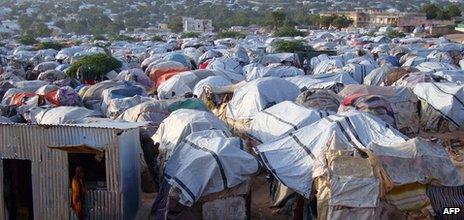
Sexual violence and rape in displaced camps was described as "endemic"
In al-Shabab-controlled areas, the UN investigators found after interviewing refugee women that girls are routinely taken from their families to be forcefully "married" to militant fighters, or "offered as a 'reward' for men who have volunteered to be suicide bombers".
Women also reported being beaten for wearing traditional Somali clothes instead of more conservative clothing favoured by the Islamists and that women who left their houses without a male relative were also beaten.
Sexual violence was also experienced by women displaced by the drought with rape in camps "being described as 'endemic' by human rights activists and aid workers alike", the report said.
7: Northern front
Al-Shabab has extended its influence further north to the semi-autonomous region of Puntland - mainly known for its pirate bases.
In February an armed group in the region - Mujahidiin of the Golis Mountains - announced it had formally joined al-Shabab and the UN investigators observed "a steady influx of al-Shabab fighters from southern Somalia and the expansion of al-Shabab operations in Puntland".
But territorial losses have also exacerbated tensions in al-Shabab's leadership threatening a formal schism in the group between Sheikh Hassan Dahir Aweys's faction and that of the overall leader, Ahmed Abdi Godane, the report says.
8: Eritrea's influence wanes
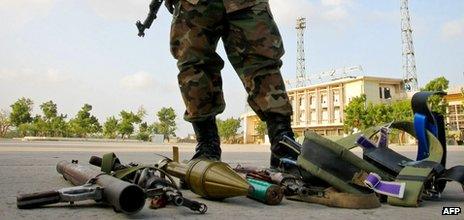
Al-Shabab receives weapons despite an arms embargo
The relative importance of Eritrea as a source of military and financial support for armed groups in Somalia seems to have declined, the UN investigators said. The country has been subject to sanctions and more scrutiny because of its support to al-Shabab.
They found no evidence to support reports that Eritrea supplied al-Shabab with arms by air late last year, though they said the country still maintains relations with known arms dealers and has violated the arms embargo through its supports of Ethiopian armed opposition groups.
9: Private armies
The use of private security company remains problematic, with Ethiopia, South Africa, Uganda and the United Arab Emirates serving as logistical hubs for such operations in Somalia in violation of UN sanctions, the report says.
Last year a police training camp in Bossasso run by Sterling Corporate Services (previously known as Saracen) became the best-equipped military facility in Somalia after the African Union bases in Mogadishu - and includes "a modern operational command centre, control tower, airstrip, helicopter deck and about 70 tents, which can host up to 1,500 trainees".
10: Diversion of humanitarian aid
Al-Shabab has banned international aid agencies from its territories, but at the height of last year's famine, the UN investigators said there were instances when aid was misappropriated in government areas, where more than 250,000 had fled in search of food.
Managers of camps for displaced people and district officials referred to as "gatekeepers" sought to control the aid, they found.
"Such tactics, combined with adverse security conditions, undermined the ability of aid organisations to verify whether aid was actually reaching the intended beneficiaries or if those beneficiaries even existed," the report said.